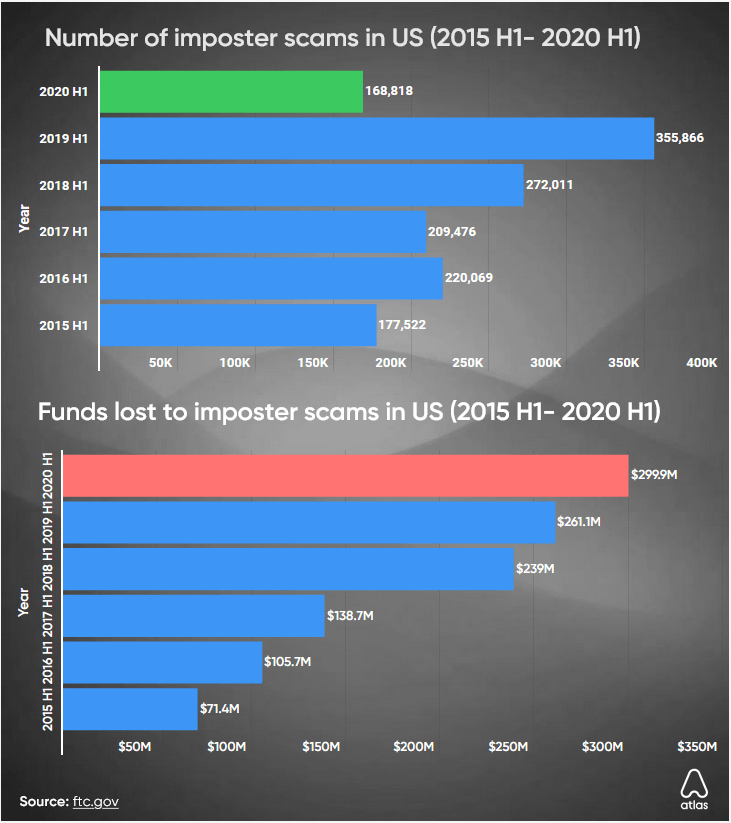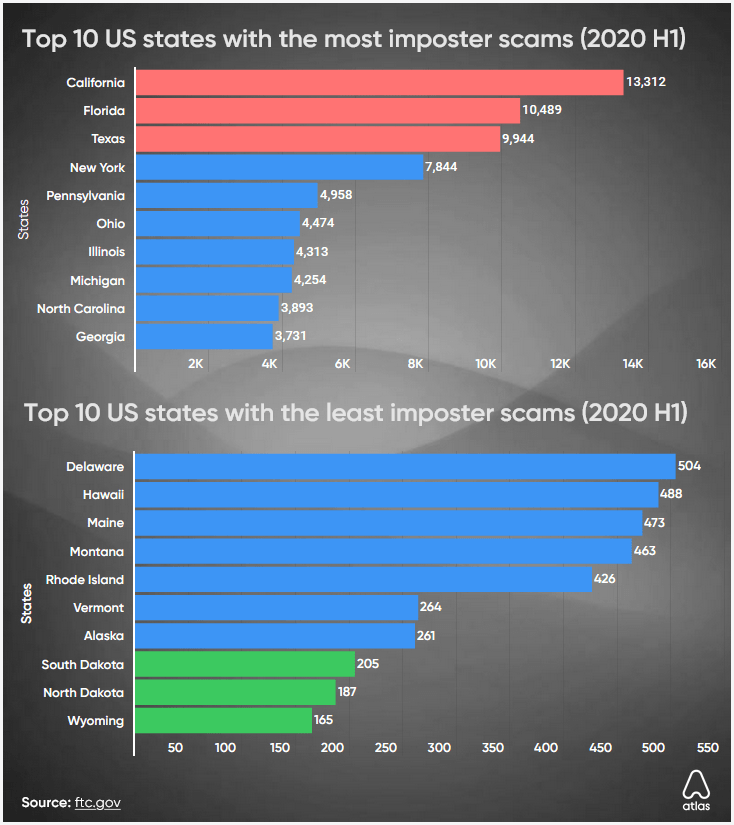Impostor scams top the list as the most common and lucrative consumer fraud in the United States six years in a row. According to data presented by Atlas VPN, US residents reported 168,818 imposter scam cases in the first half of 2020, which make up nearly one-tenth of all scams registered in the US this year.
Q3 2020 hedge fund letters, conferences and more
A total of 22% imposter scam cases resulted in monetary damages amounting to a whopping $299.9 million in losses with a median loss of $694.
Imposter scams are precisely what they sound like — criminals reach out to individuals via email, phone, or other medium posing as someone else to try and trick individuals out of funds or sensitive information. Scammers may be pretending to be a governmental institution, a bank, a love interest, or a family member as long as it is an institution or individual the victim is likely to trust.
Source: https://infogram.com/
Despite COVID-19, which, together with the pandemic, brought about a spike in scams, the actual number of imposter scams dropped by 53% from 355,866 imposter cases in 2019 H1 to 168,818 imposter fraud cases in 2020 H1.
In fact, imposter scam numbers are the lowest they have been in the past six years. However, the amount of funds lost to such scams has been growing steadily since 2015, suggesting that imposter fraud is becoming more sophisticated.
Losses to imposter scams have increased by 320% from $71.4 million in the first half of 2015 to a whopping $299.9 million in the first half of 2020. Compared to last year, when US residents lost $261.1 million to imposter fraud cases, it grew by 15%.
California saw the most imposter scams
Most imposter scam cases were registered in California, where residents reported 13,312 imposter fraud cases — 8% of all this year's cases. Compared to the same time last year, when 38,732 imposter fraud cases were registered, imposter fraud dropped by 66%.
California is closely followed by Florida, where consumers logged in 10,489 imposter scams this year. Imposter fraud cases in Florida make up 6% of the total amount of this type of scams reported in 2020 H1. Compared to the first half of 2019, which saw 19,648 imposter scams, the number of such scams dropped by 47% this year.
Rounding up the top 3 list is Texas with 9,944 scam cases, which account for 6% of the total imposter fraud cases reported in the first half of 2020. In Texas, imposter fraud dropped by 48% compared to the same period last year, when 19,180 scams were reported.
Source: https://infogram.com/
Other states which faced a significant number of imposter scams in the first half of this year include New York (7,844), Pennsylvania (4,958), Ohio (4,474), Illinois (4,313), Michigan (4,254), North Carolina (3,893), and Georgia (3,731).
Wyoming had the least amount of imposter fraud cases in the first half of this year compared to the rest of the US. Wyoming residents logged in 165 imposter fraud cases, constituting merely 0.01% of the total amount of imposter fraud cases in the US this year. Following the general downward trend, the number of imposter fraud cases in Wyoming dropped by 56% compared to 2019 H1, which saw 379 imposter fraud cases.
Other US states which had the least amount of imposter fraud this year include North Dakota (187), South Dakota (205), Alaska (261), Vermont (264), Rhode Island (426), Montana (463), Maine (473), Hawaii (488), and Delaware (504).
Scammers most likely to pose as government representatives
Consumers should always stay vigilant and never give out sensitive information before making sure they know whom they are dealing with as scammers can pretend to be virtually anyone. However, data registered by the Federal Trade Commission (FTC) shows that criminals are most likely to pose as government representatives.
A total of 62,970 imposter fraud cases registered in the first half of 2020 involved scammers pretending to be government workers. Together they make up 37% of all imposter fraud cases this year.
Scammers also often pose as company representatives. There were 49,585 such scams reported this year, accounting for 30% of all this year's imposter fraud cases.
Another method frequently employed by imposter scammers is posing as tech support. Scams, where criminals were pretending to be tech support personnel, were reported 34,249 times in the first half of 2020 and make up one-fifth of this year's imposter fraud cases.
Apart from company personnel, scammers may also pose as love interests to lure out money from unsuspecting victims. Romance scams were reported 12,292 times and comprise 7% of the total amount of imposter scams in 2020 H1.
Scammers were least likely to pose as a friend or family member. Nevertheless, such scams were still registered 10,541 times and constitute 6% of the total amount of imposter scam cases this year.







